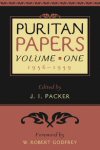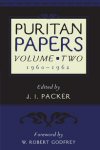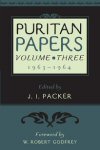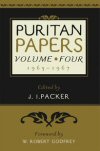Puritan Papers (5 vols.) (1956–1969)
Digital Logos Edition
Overview
From 1956 to 1969, a group of prominent evangelical scholars including D. Martyn Lloyd-Jones, J.I. Packer, and Iain Murray, convened annually to present papers reflecting on the thought, practice, and influence of the Puritans. Editor J.I. Packer notes that the papers are designed to be “practical and constructive, not merely academic,” and helpful to pastors as well as the whole church. This resource contains all 76 studies presented at the conference that played a vital role in reinvigorating evangelicalism in Great Britain and beyond. The Puritan Papers treat an array of subjects from John Owen, Jonathan Edwards, and John Knox; to Puritan approaches to discipline, revival, and worship; to use of catechisms and the work of a minister; to the Arminian conflict and the study of church history.

- Five volumes containing all the Puritan Papers, presented between 1956 and 1969
- 76 contributions from prominent evangelical scholars
- Studies of Puritan theology, practice, and history
- Biographies of important figures such as John Owen and George Whitefield
- Edited by J.I. Packer
- Title: Puritan Papers (1956–1969)
- Editors: J.I. Packer
- Publisher: P&R
- Volumes: 5
- Pages: 1,482
- Christian Group: Reformed
- Resource Type: Collected Essays
- Topic: Theology; Practical Life; Missions; Church History

J.I. Packer, D. Martyn Lloyd-Jones, Iain Murray, and Ernest Kevan are among the distinguished contributors to this compilation of papers on a wide range of topics pertaining to Puritan and Reformed teaching, piety, and life. This volume, the first in a series, captures the principles and passion of Puritan belief as presented in the Puritan and Reformed Studies Conferences of 1956–1959.
The 23 papers gathered here are, by design, “practical and constructive, not merely academic,” says Packer, and helpful to pastors as well as the whole church.
Topics include interpreting Scripture; Christian experience; worship; the Lord’s day; the life and work of a minister; dealing with troubled souls; the law and the covenants; discipline; and revival.

J.I. Packer’s chapters on Jonathan Edwards’ theology of revival, the Puritan idea of communion with God, and the Puritan conscience serve as highlights of the second volume of Puritan Papers. Equally important are D. Martyn Lloyd-Jones’s chapters on true and false knowledge and “Puritan Perplexities: Lessons from 1640–1662.”
Biographical chapters feature, in addition to Edwards, Philip Doddridge, John Knox, William Perkins, Thomas Boston, and John Owen.
Themes developed in these 16 papers include: apostasy, communion with God, Christian joy, missions, preaching, divine intercession, casuistry, conscience, and Christology.

John Calvin, a beacon for the Puritans, is spotlighted in this volume of Puritan Papers, originally presented on the 400th anniversary of the Reformer’s death. J.I. Packer writes on Calvin as “a servant of the Word,” and O.R. Johnston on Calvin the man. Additional chapters treat Calvin’s doctrine of God, his Institutes, and sixteenth-century Geneva.
Other biographical chapters feature George Whitefield (by D. Martyn Lloyd-Jones) and Charles Haddon Spurgeon (by D.M. Whyte). In addition, Packer writes on the Puritan approach to worship, Iain Murray on “things indifferent,” and Lloyd-Jones on John Owen’s view of schism.

The Reformers and the Puritans receive most of the attention in the fourth volume of Puritan Papers—16 papers originally presented at the annual Puritan and Reformed Studies Conferences in London, 1965–1967. J.I. Packer, the guiding force behind these conferences, contributes three chapters on Martin Luther; John Owen on communication from God; and the Puritans and spiritual gifts.
Other chapters on the Reformation treat Zwingli (D.W. Marshall), the Anabaptists (D.P. Kingdon), Cranmer (G.S.R. Cox), and Knox (S.M. Houghton). Additional chapters on the Puritans focus on their view of catechisms (J. Lewis Wilson), Richard Baxter’s Reformed Pastor (J.A. Caiger), and Oliver Heywood (W.H. Davies). Chapters are also devoted to “Ecclesiola in Ecclesia” (D. Martyn Lloyd-Jones), Charles Finney (P.E.G. Cook) and Abraham Kuyper (Rex Ambler).
These conferences, which began in 1956, helped to stir interest in the Puritans among Evangelicals in the UK.

Volume 5 concludes the Puritan Papers—a compilation of papers originally given at an annual conference that played a vital role in reinvigorating evangelicalism in Great Britain and beyond. This final volume contains 11 chapters, two by editor J.I. Packer: “Arminianisms” and “The Doctrine of Justification among the Puritans.” This volume also includes John R. de Witt’s “The Arminian Conflict and the Synod of Dort” and David R. Smith’s “John Fletcher: An Arminian Upholder of Holiness.”
The final chapter, D. Martyn Lloyd-Jones’ “Can We Learn from History?” is a fitting conclusion to the five volumes. He notes, “it is always essential for us to supplement our reading of theology with the reading of church history. . . . if we do not, we shall be in danger of becoming abstract, theoretical, and academic in our view of truth; and, failing to relate it to the practicalities of life and daily living, we shall soon be in trouble.”
J.I. Packer is the Board of Governors’ Professor of Theology at Regent College and an executive editor for Christianity Today. Best known for his bestselling classic Knowing God, Packer is the author or editor of more than 30 books. He is considered one of the most influential evangelicals in North America. He committed his life to Christian service after hearing lectures from C.S. Lewis while studying at Oxford. In the 1950s, Packer was ordained a deacon and priest in the Church of England. Before moving to Canada, he lectured at several schools, including Tyndale Hall in Bristol, Latimer House in Oxford, and Oak Hill Theological College in London.